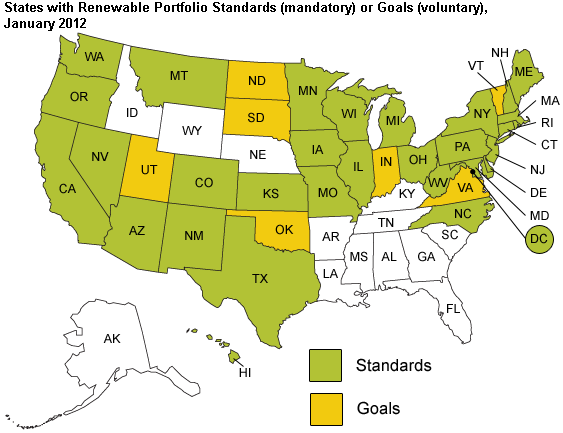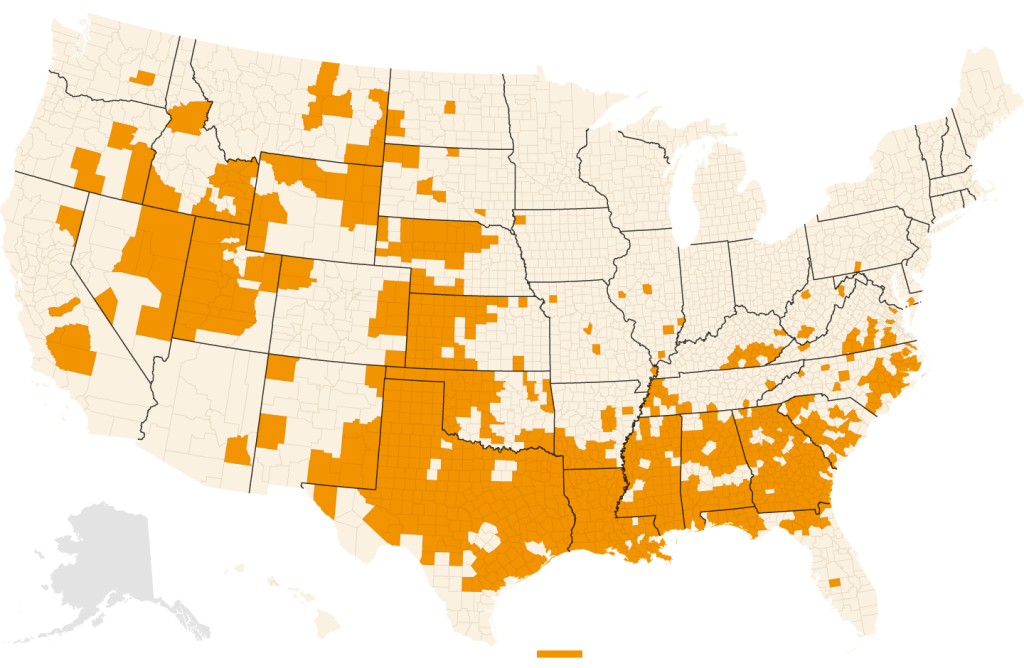Renewable Energy and Political Geography
The Washington Post had a story over the weekend about the concerted campaign by the fossil fuel industry to rollback state laws favoring renewable energy. This effort was also the subject of an editorial in the Sunday Times. So far, this effort hasn’t gained real legislative traction. The story attributes this failure to the growth of the renewable energy industry as a political force. I agree that this is part of the political dynamic. So is the general public popularity of renewable energy, even among people who don’t believe in climate change. But it’s important to see that the rollback effort begins at a considerable disadvantage for geographic reasons.
We can start to see this by looking at a map of states with renewable portfolio standards:

The trouble, from the perspective of repeal advocates, is that many of the areas of strongest Republican strength don’t have renewable portfolio standards in the first place. For instance, according to a recent article in the NY Times, 40% of Republican voters live in Southern states, which generally don’t have an existing RPS.
This map from the same article shows areas of Republican dominance, where Obama got less than 20% of the white vote:

These voters add little to the repeal effort because they tend to live in states without an RPS. If states aren’t already doing anything about renewable energy, there’s nothing to rollback. So much of the battle over renewables will necessarily be fought on terrain more favorable to proponents of existing regulation.
The big exception is Tezas, a staunchly Republican state that also has done a lot to promote renewable energy. But chances of driving renewables out of Texas aren’t good. Texas has been a leader in wind energy, but it’s for very practical, non-environmental reasons. The state has abundant sources of wind and needs a hedge against price fluctuations for natural gas, which is the mainstay of its electricity sector. So the prospects for eliminating wind power in Texas aren’t good either.
The geographic disadvantage of the repeal forces doesn’t mean their campaign is doomed, especially given the amount of money that the Koch brothers and others are devoting to the effort. A number of states with RPS standards currently have Republican legislators or governors, partly as a result of the GOP surge in 2010. It is in those states that other factors become important, such as the political strength of the renewable energy industry and public support for renewables. But overall, geography gives the anti-renewable forces an uphill fight.
Reader Comments
One Reply to “Renewable Energy and Political Geography”
Comments are closed.







This is pushback against 111d of the CAA which will likely result in all states pursuing more clean energy options not just the ones that already have. The coal folks have figured out that for most states with RPS requirements it won’t be too difficult to deal with the first round of 111d requirements. Then as the carbon restrictions will get racheted down over time–unless clean coal becomes a commercial reality–those increased carbon restrictions will lead to the coal death spiral. I think that CCS has to be commercialized to get China and India on a carbon diet (and that is where this anti-RPS money should be going). Most states–even my own politically conservative state of Nebraska (no state RPS or EE yet)–can probably meet the likely first round of carbon restrictions through (in our case) voluntary utility RPS and EE programs. The flawed logic of the coal folks seems to be that if we can make RPS (and EE if they were on the ball) go away, then 111d-type carbon restrictions would be more difficult to comply with. I think the ship has already sailed on that but we shall see. The coal lobby is threatened by the likely role of RPS and EE in getting EPA carbon regs operational across the US (and with the implications for increased global carbon limits), and has to be worried about coal’s low growth rates and even declining demand in the US. If we don’t get commercialized CCS they have reason to worry but need to force themselves to take a more constructive approach (wishful thinking). 🙂